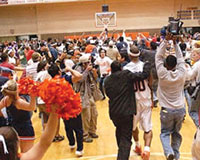NCAA News Archive - 2006
« back to 2006 | Back to NCAA News Archive Index
Crowd-control summit participants want to balance celebration, risk
|
The NCAA News
Building on best practices developed at a 2003 gathering in Dallas, representatives from Divisions I, II and III institutions convened April 8 at the NCAA Postgame Crowd Control Summit and began developing plans to ensure that appropriate fan behavior is more of a priority at all colleges and universities.
The 12-member panel identified broad-based areas of emphasis for schools to consider and agreed to develop a checklist or toolkit to give institutions a menu of options they can tailor to meet their individual needs. Members plan to encourage crowd control as an agenda item for conference meetings this spring and then present formal recommendations to presidential bodies in the governance structure by August. The goal is to build momentum and presidential buy-in by the beginning of the 2006-07 academic year.
• Safety of personnel (players, coaches, officials, athletic trainers, managers, administrators);
• Safety of the fans; and
• Preservation of property (facility amenities, phones, cameras, game equipment).
The checklist would contain a variety of alternatives to allow schools the flexibility they need to fit their individual circumstances. To increase accountability, the summit panel is considering presidential sign-off, much like the recruiting task force did last year when it required institutions to develop stricter policies for official visits.
Compelling testimony
Summit participants heard a number of presentations to help frame their discussions, including one from Samuel Schuman, chancellor of University of Minnesota, Morris, where a student was killed during a goal-post incident last fall.
After offering a detailed description of a seemingly harmless celebration that turned tragic after Minnesota-Morris won a dramatic homecoming game, Schuman called for all presidents and chancellors to be more involved in establishing policies to address the variables that contribute to inappropriate postgame behavior.
“It’s too easy to say that fan control is someone else’s job,” Schuman said. “It’s better to think about procedures before an incident than after. It may take time, but it is infinitely preferred to dealing with a tragedy afterward.”
Schuman’s story affected summit participants not only because of the severity of the incident, but also because of where it took place. Minnesota-Morris is a Division III institution with an enrollment of about 1,900 students. Recent examples of inappropriate and sometimes dangerous postgame behavior ranging from fans rushing the field to off-campus riots have been highly publicized, but most have occurred at larger schools.
“Uncontrolled behavior can happen at small, academically rigorous liberal arts colleges, too,” Schuman said. “And it does not take thousands of participants for a tragedy to occur.”
Indeed, only about a dozen students contributed initially to the Minnesota-Morris case. That group, many of whom were student-athletes from other Minnesota-Morris teams, was turned away from one goal post by campus police but accessed the other goal post and called on fellow students and team members from the stands to join the celebration. The student who was killed was hanging onto the cross bar when the apparatus fell.
“Good people can be responsible for bad things,” Schuman said. “The students involved were good people, but adolescent exuberance can be overwhelming.”
Schuman said Minnesota-Morris will purchase collapsible goal posts for future games. About a dozen Division I schools already have done that.
In that vein, summit participants agreed to ask the NCAA Football Rules Committee to consider the issues surrounding goal-post safety and whether it would be prudent to recommend or even require alternative technology.
Another outcome of the summit was an effort to keep the crowd-control issue on the front burner indefinitely. Members noted that the National Association of Collegiate Directors of Athletics will conduct a session on sportsmanship and crowd control in June as part of its annual convention. They also agreed to ask the NCAA Committee on Sportsmanship and Ethical Conduct to make the issue a standing agenda item.
© 2010 The National Collegiate Athletic Association
Terms and Conditions | Privacy Policy

